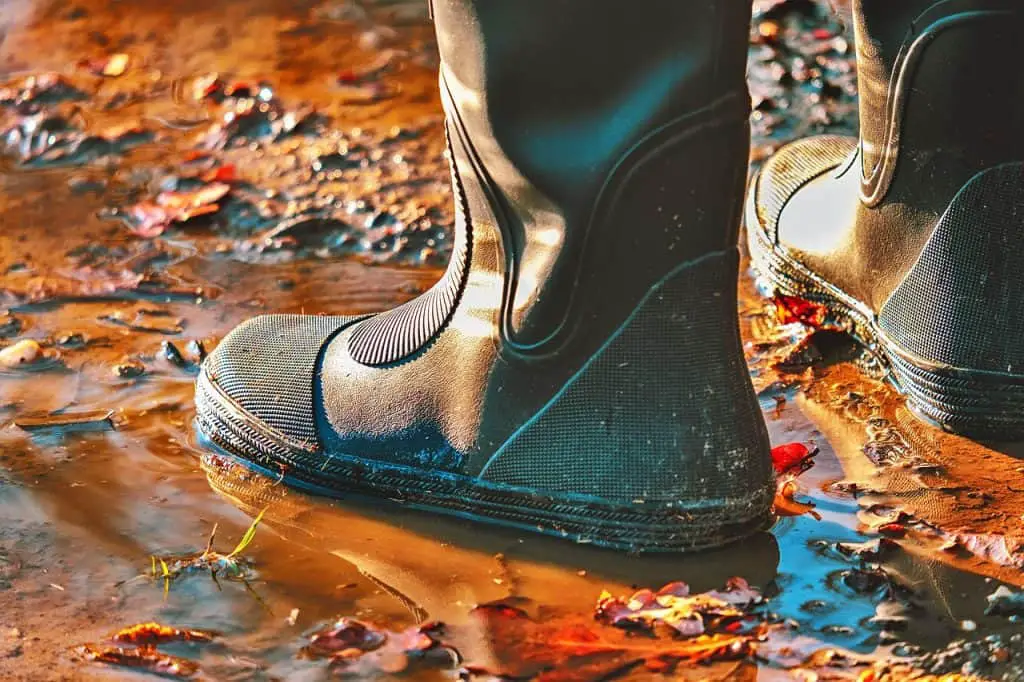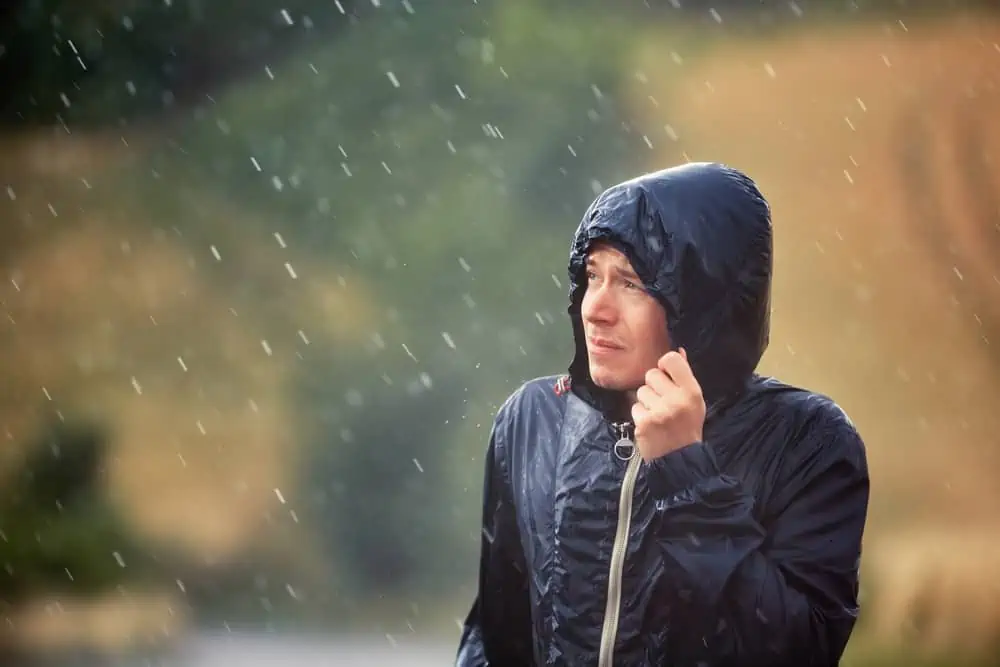Scotchgard and Nikwax seem like they are the same product, but they are not. Scotchgard is a water repellent for fabric that you put on your clothes before washing them. Nikwax is a waterproofing agent that you apply to outdoor gear after it has been washed.
This article provides the key differences and similarities that will help you make the right decision for these two brands.
Scotchgard vs. Nikwax Comparison
Both Scotchgard and Nikwax are products that are designed to make gear water-resistant and are usually included in outdoor products. For leather products, Scotchgard is the better option between the two, well Nikwax works well with items like shoes, backpacks, and tents.
When Should You Use Scotchgard Outdoor Water Shield?
Scotchgard has two outdoor protectors that can be used on a variety of gear that’s left or used outside.
Here are some common items that people use Scotchgard on:
- Rain gear
- Umbrellas
- Backpacks & tents
- Other outdoor gear for hiking and backpacking
These sprays are also safe to be applied on outdoor fabrics and materials like polyester, nylon, and cotton.
When Should You Use Nikwax Waterproofing Spray?
Nikwax has a protector spray that works to make outdoor clothing, shoes, boots, and other equipment waterproof. This is especially important for situations where you’ll be outside walking or moving around in the rain.
Here are a few items that Nikwax is commonly used on:
- Fleece and cotton fabrics
- Tents
- Rucksacks
- Shoes & boots
They offer many options for waterproofing depending on the type of gear and materials that you’ll be applying it to.
Similarities Between Scotchgard and Nikwax
Waterproofing
Both brands make waterproofing products. Nikwax and Scotchgard both make a waterproofing agent for leather. You don’t apply it before you wash your item, but rather afterward.
All you do is put the liquid on the fabric and wipe off excess, so it doesn’t leave any smudges, then you let it dry.
They both make a waterproofing spray for fabric; however, they both come in different forms. Scotchgard makes sprays and aerosol sprays, while Nikwax makes a wash-in and a wipe-on type.
Protection against water & stains
Another similarity is that both brands help protect against water and stains (Scotchgard is mainly used to keep colors from running while Nikwax helps create a barrier from the elements on your gear), but are not the only brand out there that have this type of product.
Color fading
In addition, both brands prevent color fading on clothing and allow clothes to be machine washed, or at least they make the claims. For example, Scotchgard is a cleaner and fabric protector for washable wool, permanent press fabrics, non-colorfast fabrics, silk, and leather.
Lastly, both brands are very similar in that 3M makes them.
Differences Between Scotchgard and Nikwax
Type of Waterproofing
Scotchgard is a fabric protector, while Nikwax is a waterproofing agent for outdoor gear. There are two different types of Scotchgard: pre-wash and post-wash.
Pre-wash protects clothes from spills and stains before you wash them in the washing machine. Post-wash keeps colors from running and works for all fabrics except white cotton.
Nikwax only sells one kind of product that protects your items from water and prevents color fading on fabrics that have been exposed to the sun, such as canvas shoes or bags, tents, etc., but it does not protect against stains as Scotchgard does. Further, you only need to use it once every 3 washes.
Scotchgard is specifically for fabric and does not work on leather, whereas Nikwax works on both. It also says that it can be used to waterproof hiking boots and equipment like tents.
But when it comes to fabrics, water-based or spray formulas are much better to use when it comes to gear such as tents because they dry faster when exposed to the sun. However, no matter what formula you choose, make sure you follow their instructions carefully when applying it.
When To Apply The Spray
Scotchgard can be applied to something before you wash it, but most people use it after the item is already clean because dirt on the item could potentially leave marks on the fabric when cleaning agents come into contact with it.
It comes in different forms, including aerosol spray bottles and wipes, so you don’t have to rinse it off.
Barriers
Another difference is that Scotchgard’s main purpose is more to repel water rather than create a waterproof barrier as Nikwax does. Scotchgard assumes that you are already wearing water-resistant clothing; therefore, its main use is to repel stains, which is great if you’re looking for something that will work well on dark colors of fabric.
Experience
Nikwax has been around longer than Scotchgard, so they have more experience and credibility when it comes to producing outdoor gear waterproofing products.
They have more product features and variations of their waterproofing agent, especially for vinyl and rubber, to what Scotchgard offers. Nikwax also makes a vegan product line of their waterproofing agent.
Process
Another key difference is their manufacturing processes. Scotchgard uses a fluorochemical formula that creates a film on top of whatever it is applied to.
When dirt comes in contact with this treated surface, it will be knocked off. However, the fine print of this is that Scotchgard uses non-renewable sources to create its formula, which means it is not considered an environmentally friendly product.
Nikwax, on the other hand, uses water-based formulas instead of fluorochemical ones like Scotchgard does. They also use renewable plant-derived ingredients in all aspects of their manufacturing process.
This includes ingredients for processing and packaging. Of course, they do test everything thoroughly to make sure it’s safe for human use, but still, they consider themselves more environmentally friendly than Scotchgard does.
Environmentally Friendly
In terms of being environmentally friendly, when it comes down to it, this is probably one of the most important factors when deciding which waterproofing agent to purchase.
Not only does Nikwax state that their products are Vegan-friendly, but they also claim their entire process of creating and packaging their technical fabric waterproofing agents is environmentally friendly.
These claims come from the fact that VFC (the company behind both brands) uses renewable plant-derived ingredients for all aspects of their manufacturing process. This includes ingredients, processing, and packaging.
They also test on human volunteers to ensure the product is safe for people to use rather than on animals, as many manufacturers of household products do.
Scotchgard does not have any information about their manufacturing or environmental practices online, as far as I can tell. However, from what little they do say, it appears that Scotchgard uses a fluorinated formula to create their water repellent barriers which are similar to the non-renewable sources
Nikwax uses in the production of their products so environmentally speaking, both brands are about equal when it comes to this factor.
Final Verdict
Both brands have many products to choose from but they target different types of people. If you’re the type that is always wearing gear that’s made out of synthetic material, then Nikwax would be better for you because it specifically targets those fabrics.
On the other hand, if most of your clothing is made up of natural fibers or dark colors and you aren’t as concerned about creating a barrier as you are with keeping water and stains away, then Scotchgard would probably be best for you.
Both brands offer great products and, if used properly, will keep your items protected.




